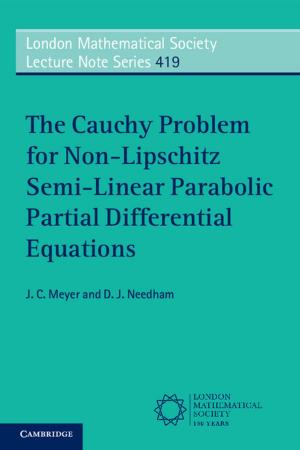Descriptive Complexity, Canonisation, and Definable Graph Structure Theory
Nonfiction, Science & Nature, Mathematics, Logic, Computers, General Computing| Author: | Martin Grohe | ISBN: | 9781108227988 |
| Publisher: | Cambridge University Press | Publication: | August 17, 2017 |
| Imprint: | Cambridge University Press | Language: | English |
| Author: | Martin Grohe |
| ISBN: | 9781108227988 |
| Publisher: | Cambridge University Press |
| Publication: | August 17, 2017 |
| Imprint: | Cambridge University Press |
| Language: | English |
Descriptive complexity theory establishes a connection between the computational complexity of algorithmic problems (the computational resources required to solve the problems) and their descriptive complexity (the language resources required to describe the problems). This groundbreaking book approaches descriptive complexity from the angle of modern structural graph theory, specifically graph minor theory. It develops a 'definable structure theory' concerned with the logical definability of graph theoretic concepts such as tree decompositions and embeddings. The first part starts with an introduction to the background, from logic, complexity, and graph theory, and develops the theory up to first applications in descriptive complexity theory and graph isomorphism testing. It may serve as the basis for a graduate-level course. The second part is more advanced and mainly devoted to the proof of a single, previously unpublished theorem: properties of graphs with excluded minors are decidable in polynomial time if, and only if, they are definable in fixed-point logic with counting.
Descriptive complexity theory establishes a connection between the computational complexity of algorithmic problems (the computational resources required to solve the problems) and their descriptive complexity (the language resources required to describe the problems). This groundbreaking book approaches descriptive complexity from the angle of modern structural graph theory, specifically graph minor theory. It develops a 'definable structure theory' concerned with the logical definability of graph theoretic concepts such as tree decompositions and embeddings. The first part starts with an introduction to the background, from logic, complexity, and graph theory, and develops the theory up to first applications in descriptive complexity theory and graph isomorphism testing. It may serve as the basis for a graduate-level course. The second part is more advanced and mainly devoted to the proof of a single, previously unpublished theorem: properties of graphs with excluded minors are decidable in polynomial time if, and only if, they are definable in fixed-point logic with counting.















